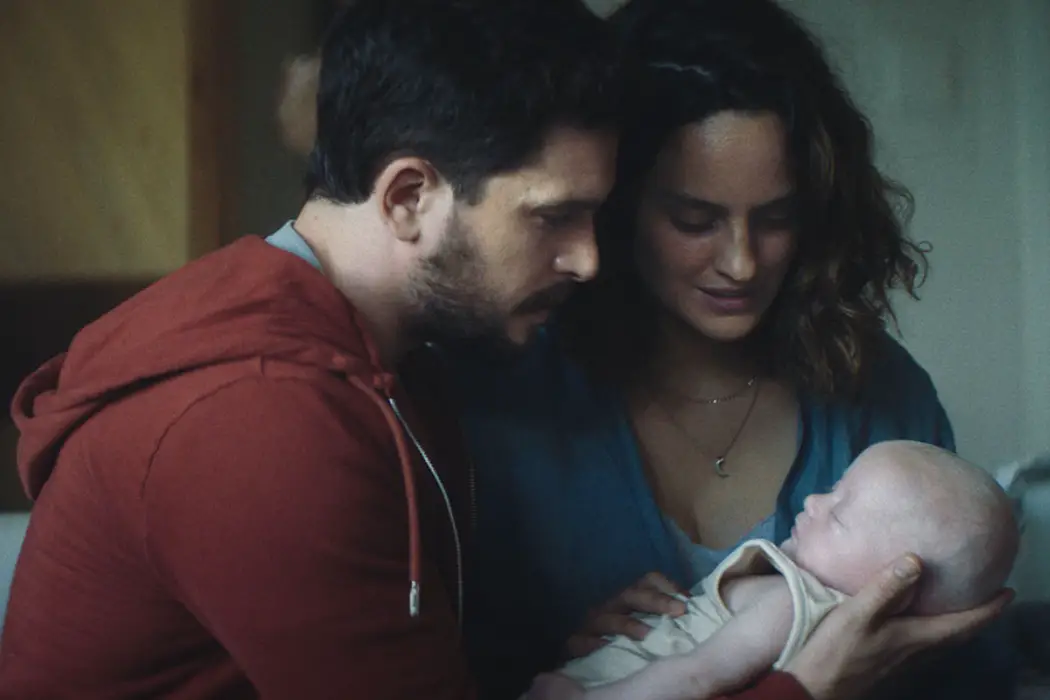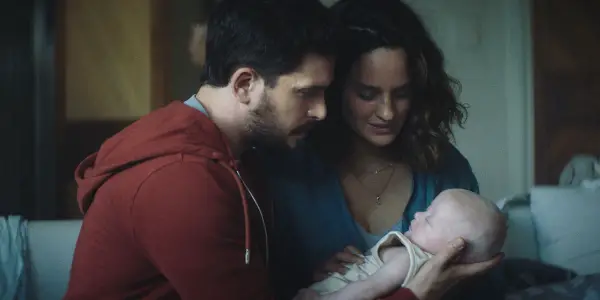Toronto International Film Festival 2022: BABY RUBY: A Powerful Message That Overcomes Its Tropes

Kevin L. Lee is an Asian-American critic, producer, screenwriter and…
It’s not easy to confront some of the darkest, hidden thoughts you might’ve had during moments where you really shouldn’t. Consider the sudden anxieties and rush of emotions when a woman becomes a mother for the first time, and the baby cries and cries and cries. On one end, the parental instincts kick in, and you would move heaven and earth to protect your child. But is there ever a moment, a split second, where you thought of the darkest thing to get rid of the child and be at peace?
Such ideas are all thrown together in a pot as it reaches its boiling point in Baby Ruby, an exploration of postpartum psychosis centered around Jo (Noémie Merlant), whose life and sanity starts to fall apart as she struggles to take care of her new baby Ruby.
Psychological Thriller Tropes
Writer/director Bess Wohl approaches Baby Ruby like a psychological thriller. Jo begins to experience several terrifying visions, as her grasp of reality begins to falter. Add this on top of her loss of sleep and the problems compound. Quickly, Jo tries to find help from the people around her, but we can see quickly that her husband Spencer (Kit Harrington) is not a useful partner, despite being vocally supportive of her efforts to be a good mother. Moreover, Spencer’s mother (Jayne Atkinson) is too involved with their lives that the film, like any good thriller, makes us suspect if there’s anything sinister behind her motivations to help.

During all of this, the film progresses with a slow burn. The narrative doesn’t move as fast as one would hope, and several beats are repeated over and over again, in a similar fashion as a horror movie is obligated to have a jump scare every ten minutes or so. The first half of Baby Ruby can arguably be described as experimental, because it feels like Wohl is attempting any kind of camera, sound, or editing technique to hook us in. The result is a mixed bag of sequences, with some effectively creeping under my skin and others being unintentionally funny or grating.
Noémie Merlant Carries the Film’s Interesting Ideas
With the script unable to offer anything new beyond hallucinations and situations that make Jo anxious, Baby Ruby relies almost entirely on Merlant to carry us to the finish line. Her performance here is as physical as it is internal, while keeping Jo a character for us to empathize. Though there isn’t anything negative about the supporting cast of actors (Atkinson is quite good and Meredith Hagger is convincing as a happy-go-lucky mother), the script lives so much in Jo’s head that only Merlant is left to carry some of the film’s more interesting ideas – a particular one is Jo thinking Ruby is crying on purpose because she hates her.
Merlant continues to show why she’s one of the best actresses working today, but I so wish the script worked in her favor more. It’s not until the third act of the film that Baby Ruby finally confronts its subject matter head-on, in a finale that I found to be emotionally rewarding and important to talk about.
Baby Ruby: A Flawed Film with a Powerful Message
Even for an 89-minute film, Baby Ruby would’ve worked better with ten to fifteen minutes trimmed off. On paper, it plays like a short film stretched to feature length, with a powerful message about the lack of support new mothers have, but most importantly, how so much of motherhood is a battle with the self.
Though it falls into some psychological thriller tropes that are more silly than they are effective, Baby Ruby gets its message across thanks to a phenomenal performance by Merlant and a gentle sensibility by Wohl as it approaches its resolution. It’s a subject matter rarely talked about or confronted with this much grit, and for that reason, I admire its courage.
What did you think of Baby Ruby? Let us know in the comments below!
Baby Ruby premiered at the Toronto International Film Festival. It is currently seeking distribution.
Watch Baby Ruby
Does content like this matter to you?
Become a Member and support film journalism. Unlock access to all of Film Inquiry`s great articles. Join a community of like-minded readers who are passionate about cinema - get access to our private members Network, give back to independent filmmakers, and more.
Kevin L. Lee is an Asian-American critic, producer, screenwriter and director based in New York City. A champion of the creative process, Kevin has consulted, written, and produced several short films from development to principal photography to festival premiere. He has over 10 years of marketing and writing experience in film criticism and journalism, ranging from blockbusters to foreign indie films, and has developed a reputation of being “an omnivore of cinema.” He recently finished his MFA in film producing at Columbia University and is currently working in film and TV development for production companies.













